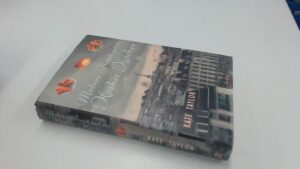Madame Proust and the Kosher Kitchen by Kate Taylor; London: Chatto & Windus (c) 2003; ISBN 9780701-173746; 432 pages.
By Dorothea Shefer-Vanson

 MEVASSERET ZION, Israel — As an ardent devotee of In Search of Lost Time, Proust’s monumental novel of life, love, manners, mores and everything else in nineteenth-century France, I was attracted by the title of this novel. However, when I started to read it, with its implicit reference of the impending Shoah, I found myself wondering whether it would be worthwhile to continue.
MEVASSERET ZION, Israel — As an ardent devotee of In Search of Lost Time, Proust’s monumental novel of life, love, manners, mores and everything else in nineteenth-century France, I was attracted by the title of this novel. However, when I started to read it, with its implicit reference of the impending Shoah, I found myself wondering whether it would be worthwhile to continue.
My perseverance paid off, however, and I soon found myself immersed in what seemed to be the diary entries kept by the woman who was Marcel Proust’s mother, describing the daily life of a bourgeois family, of whom the son, Marcel, was a constant source of worry, and sometimes even anguish.
The book consists of three main narrative strands: the aforesaid diary entries; the more modern-day saga of a twelve-year old girl, Sarah, sent from Nazi-occupied France to Canada, where she is taken into the home of a childless Jewish couple; and the contemporary life and unrequited love of a young Canadian woman who is undertaking research into the life of Marcel Proust in the national library of France in Paris.
The segments describing the diary purportedly kept by the mother of Marcel Proust accurately reflect known events and episodes in his life. Marcel Proust wrote by night and slept in the day in his cork-lined Paris apartment insulated against noise. Many of the details of Proust’s life — his tendency to suffer from attacks of asthma, his general sickliness, even hypochondria, his fascination with ‘high society’ and his financial excesses — are reflected in his mother’s anxious reports of his behaviour, and its effect on the family, and on her in particular. I found this beautifully-written segment utterly fascinating and even convincing.
The life of the refugee child Sarah and her adoptive parents in Ottawa is also interesting, though less enthralling. Her adolescence and eventual marriage to a respectable, rather orthodox Jewish man in Ottawa gives rise to the extremely detailed account of the dietary requirements of the kosher kitchen of the title, which I found rather tedious. Altogether, the strand involving Sarah and her unsteady psychological development arising from the trauma of the separation from and eventual loss of her parents, has a morbid fascination of its own, but tends to be more depressing.
The saga of the narrator’s doomed love for a young man who turns out, like Proust, to have been homosexual is another -rather confusing strand to the book, and the introduction of her professional experience as a simultaneous translator merely serves to add to the confusion, in my view.
The author provides an afternote in which she describes how she has invented the account of her experience in the national library and the creation of Madame Proust’s diary entries, arousing my admiration for her inventiveness and imagination.
Perhaps Kate Taylor has tried to pack too much into the confines of a single novel, though the parallels between the lives of Sarah, the narrator and Marcel Proust’s mother are interesting, albeit somewhat far-fetched. Loving someone who is unattainable or whose character is impenetrable is always difficult, and that seems to have been the fate of most of the characters in this book which, despite my reservations, is definitely worth reading.
*
Dorothea Shefer-Vanson is an author and freelance writer based in the Jerusalem suburb of Mevasseret Zion, Israel.